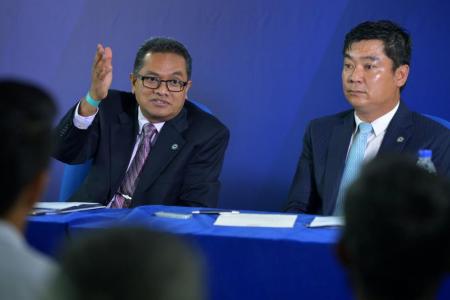Tan: Asean Super League can lift football in South-east Asia
The Asean Super League (ASL) has been in the pipeline for ages, with one postponement following another after long periods of silence from its organisers.
Led by former Football Association of Singapore (FAS) president Zainudin Nordin, with the backing of the Asean Football Federation (AFF), the ASL is now pencilled in for a 2018 kick-off.
Some in the fraternity are hailing its commercial potential, while others fear it is a death knell for domestic football leagues.
Bernard Tan, vice-president of the Football Association of Singapore (FAS) provisional council, believes the ASL can lift regional football, but there has to be serious commitment if it gets underway.
Speaking to The New Paper in his personal capacity, Tan said: "It is a big gamble, and there is no guarantee that it will work.
"But having said that, the ASL promises to provide players in the region with a high level of football, week in, week out."
Tan believes that football in the Asean region has fallen far off the pace compared to other parts of the world.
He pointed to the world ranking of Asean countries - the 122nd-ranked Philippines are the top regional side - as a sign of stagnation in South-east Asia. Singapore, ranked 75th in the world in 1993, are now 164th.
Tan feels that the privately run ASL will also mean that football associations across the region can invest their funds elsewhere.
The ASL is an attempt to bridge the gap between Asean and the rest of the world, but the sentiment is that if the ASL comes into being, domestic leagues here lose outBernard Tan, vice-president of the Football Association of Singapore
"The ASL is an attempt to bridge the gap between Asean and the rest of the world, but the sentiment is that if the ASL comes into being, domestic leagues here lose out," he said.
PRIVATE LEAGUE
"But the ASL will be a private league that does not involve FAs investing their own money, that comes from people who want to own football clubs. This will likely see rich businessmen come in from a purely commercial view point.
"Hopefully, this will mean, globally, more money put into football, allowing us to put our limited funds into other development projects. So the benefit could be felt all around"
But Tan also called for more than just a cursory commitment from the region should the ASL indeed takes off.
"There have been several rounds of signing Memorandums of Understanding (MOUs). Now is the hard work. The ASL will not happen until investors have been secured and contracts have been signed," he said.
"The hard work begins now - the organisers have to now secure commitment."
Get The New Paper on your phone with the free TNP app. Download from the Apple App Store or Google Play Store now



